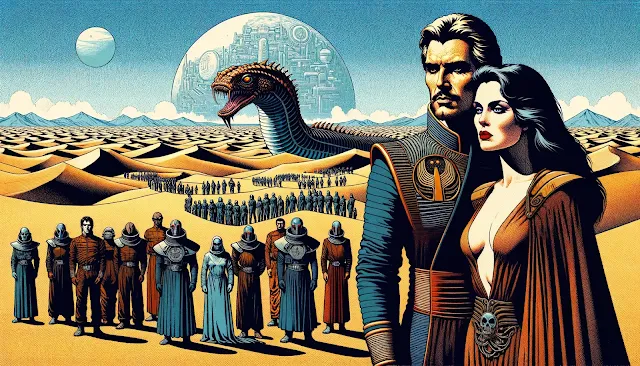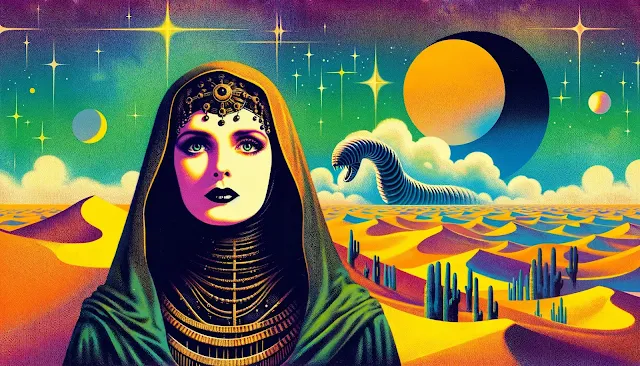His literary oeuvre, spanning from the monumental "Dune" series to lesser-known works like "The Santaroga Barrier" and "Destination: Void," serves as a rich field for exploring multifaceted themes. Herbert's work delves into philosophy, religion, psychology, politics, ecology, and more, all underscored by an abiding interest in human survival and evolution.
Herbert's nuanced portrayal of leadership extends beyond the individual, delving into the systemic structures that enable and sustain power. This exploration is particularly evident in works like "God Emperor of Dune," where Leto II's millennia-long reign offers a unique perspective on the burdens of leadership and the paradoxes of wielding absolute power for the greater good. Herbert uses Leto's transformation and ultimate sacrifice to comment on the cyclical nature of history and the inevitable corruption and stagnation that accompany prolonged rule.
This focus on survival and evolution extends beyond the physical to the mental and societal realms, exploring how adversity shapes not only biological traits but also cultural and psychological ones.
This article aims to cover the notable themes across Herbert's literary works, highlighting his unique contributions to science fiction and broader literary and intellectual discussions.
Leadership and Governance
Herbert's exploration of leadership is both profound and critical, examining the human propensity to follow charismatic figures uncritically. His portrayal of leaders, ranging from the enigmatic Paul Atreides in "Dune" to the dictatorial ruler in "The Godmakers," scrutinizes the dynamics of power and the often perilous journey of those who wield it. Herbert questions not just the nature of leadership but its impact on society, suggesting that leadership can be a double-edged sword, capable of both inspiring and devastating consequences.This theme is echoed in "The Santaroga Barrier," where Herbert explores the psychology of collective decision-making and the potential for a community to resist external manipulation, thereby offering a different lens through which to view leadership—one that emphasizes the collective over the individual.
Through these stories, Herbert illuminates the complex interplay between leaders and the societies they govern, suggesting that true leadership involves not only the exercise of power but also the foresight to nurture self-sufficiency and critical thinking among followers, thus safeguarding against the dangers of blind allegiance.
Ecology and Systems Thinking
Perhaps most revolutionary is Herbert's focus on ecology and systems thinking, particularly showcased in "Dune," where the desert planet of Arrakis serves as a complex ecosystem with interdependent life forms. This emphasis on ecological balance and the necessity for a systemic perspective reflectsHerbert's ahead-of-his-time concern for environmental issues and the interconnectedness of all things. His narratives encourage readers to consider long-term, systemic approaches to challenges, a lesson as pertinent to today's environmental crises as to the fictional worlds he created.
Herbert's ecological insights extend beyond "Dune" to novels such as "The White Plague" and "Destination: Void," where he explores the consequences of tampering with natural and artificial ecosystems. In "The White Plague," Herbert crafts a narrative around a genetically engineered virus that decimates the global population, urging a reflection on the ethics of scientific experimentation and the fragile balance of Earth's ecosystems.
Herbert's ecological insights extend beyond "Dune" to novels such as "The White Plague" and "Destination: Void," where he explores the consequences of tampering with natural and artificial ecosystems. In "The White Plague," Herbert crafts a narrative around a genetically engineered virus that decimates the global population, urging a reflection on the ethics of scientific experimentation and the fragile balance of Earth's ecosystems.
Meanwhile, "Destination: Void" delves into the realm of artificial consciousness and the creation of a self-aware entity in an isolated environment, raising questions about the nature of life and the responsibility humans hold over the systems they create. Through these stories, Herbert not only showcases his deep understanding of ecological systems and their complexities but also propels readers into a future where the sustainability of life itself hinges on the wisdom to recognize our integral role within these systems.
His work serves as a clarion call to heed the lessons of ecology and systems thinking, emphasizing that survival—be it on a desert planet or Earth—depends on our ability to understand and maintain the delicate balance of the ecosystems that sustain us.
Religion, Politics, and Power
Frank Herbert's investigation into the amalgam of religion, politics, and power reveals a nuanced understanding of their co-dependence and mutual influence, a theme most prominently illustrated in his seminal work, "Dune." In this universe, Herbert constructs a meticulously detailed society where religion is not just a set of spiritual beliefs but a pivotal element in the socio-political landscape.The Bene Gesserit, a secretive and powerful sisterhood with their own religious and political agenda, exemplifies this fusion. They manipulate religious texts and myths to engineer social and political outcomes, demonstrating Herbert's insight into how religious institutions can wield significant power within political systems. This portrayal serves as a commentary on the real-world implications of religious and political entanglements, suggesting a deliberate critique of the ways in which religious narratives can be co-opted to serve power structures and consolidate control.
Moreover, the Fremen, the indigenous people of Arrakis, embody the profound impact of messianic expectations on societal evolution and political revolutions. Herbert presents the Fremen's belief in a prophesied messiah as both a source of strength and a tool for manipulation. This messianic belief, seeded by the Bene Gesserit centuries before, illustrates how religious prophecy can be employed to shape political realities and mobilize entire populations. The Fremen's faith in Paul Atreides as their prophesied leader, Muad'Dib, becomes a driving force in the narrative, leading to a revolution that reshapes the political landscape of the galaxy. Through this, Herbert explores the power of religious fervor to unite and motivate people, while also critiquing the potential for such beliefs to be exploited by those in power.
Finally, the political scheming of the great houses within the Landsraad and the Emperor's court in "Dune" provides a fertile ground for Herbert to delve deeper into the mechanics of power. The intricate dance of alliances, betrayals, and strategic maneuvering highlights Herbert's acute understanding of political power as a game of chess, with religion and ideology as pieces to be played.
Moreover, the Fremen, the indigenous people of Arrakis, embody the profound impact of messianic expectations on societal evolution and political revolutions. Herbert presents the Fremen's belief in a prophesied messiah as both a source of strength and a tool for manipulation. This messianic belief, seeded by the Bene Gesserit centuries before, illustrates how religious prophecy can be employed to shape political realities and mobilize entire populations. The Fremen's faith in Paul Atreides as their prophesied leader, Muad'Dib, becomes a driving force in the narrative, leading to a revolution that reshapes the political landscape of the galaxy. Through this, Herbert explores the power of religious fervor to unite and motivate people, while also critiquing the potential for such beliefs to be exploited by those in power.
Finally, the political scheming of the great houses within the Landsraad and the Emperor's court in "Dune" provides a fertile ground for Herbert to delve deeper into the mechanics of power. The intricate dance of alliances, betrayals, and strategic maneuvering highlights Herbert's acute understanding of political power as a game of chess, with religion and ideology as pieces to be played.
The use of religious and political manipulation by various factions to achieve dominance underscores a cynical view of power as inherently corruptive and self-serving. Herbert's narrative suggests that in the quest for power, religious and political ideals can become intertwined to the point where distinguishing between them becomes impossible, reflecting a complex reality where the pursuit of power often transcends moral and ethical boundaries.
Human Survival and Evolution
Themes of survival and evolution permeate Herbert's work, with characters and societies often forged in the crucible of harsh environments. The Fremen of "Dune," the Sardaukar soldiers, and the inhabitants of Dosadi in "The Dosadi Experiment" are depicted as products of their extreme conditions, evolving unique strengths and survival strategies. Herbert's interest in Darwinian evolution is evident, portraying survival not just as a physical struggle but as an evolutionary imperative driving humanity toward greater potentialities.In "Dune," the harsh desert of Arrakis necessitates a culture deeply intertwined with survival, from the Fremen's water-conservation customs to their profound spiritual connection with their environment, illustrating how survival challenges can foster a deep resilience and adaptability. Similarly, in "The Santaroga Barrier," Herbert examines the survival of a society through its psychological immunity to external influences, presenting a unique exploration of collective consciousness and resistance to homogenization.
Through these narratives, Herbert suggests that the crucible of adversity is not merely a barrier to overcome but a catalyst for evolution, driving societies and individuals to develop innovative solutions, new forms of social organization, and a deeper understanding of their own capacities and potential. His work invites readers to consider how challenges can be reframed as opportunities for growth, pushing the boundaries of what it means to survive and evolve in a constantly changing universe.

Herbert's narratives often blur the lines between the two, suggesting that the capacity for both resides within each individual, shaped by external pressures and internal conflicts. In "Dune," for instance, the use of the spice melange amplifies Paul Atreides's mental faculties to superhuman levels, raising questions about the nature of sanity when one's perception of reality is vastly different from the norm.

The Nature of Sanity and Madness
Herbert's fascination with the nature of sanity and madness, influenced by figures like Thomas Szasz, challenges conventional perceptions of mental health. Through characters like Piter De Vries and scenarios that test the bounds of sanity, Herbert posits that what is considered "normal" or "abnormal" is often a matter of perspective, deeply influenced by cultural and societal norms. This exploration invites readers to question their own understandings of sanity and the stigmatization of mental illness.Herbert's narratives often blur the lines between the two, suggesting that the capacity for both resides within each individual, shaped by external pressures and internal conflicts. In "Dune," for instance, the use of the spice melange amplifies Paul Atreides's mental faculties to superhuman levels, raising questions about the nature of sanity when one's perception of reality is vastly different from the norm.
Similarly, in "The Santaroga Barrier," the entire population of Santaroga seems immune to external societal influences, leading outsiders to question the sanity of the community. Through these stories, Herbert explores how societal norms dictate the boundaries of mental health and how deviation from these norms can lead to isolation or persecution.
His work challenges the reader to consider how much of what we deem as "madness" is merely a divergence from societal expectations, encouraging a more empathetic and nuanced understanding of mental health.
-
Through these themes, Frank Herbert's literary works offer a rich landscape for readers to explore complex ideas and question the fabric of human existence and society. His legacy, marked by a deep engagement with the human condition and its potentials, continues to inspire readers and writers alike, cementing his place as a visionary in science fiction and beyond.

%20frank%20herbert.webp)















